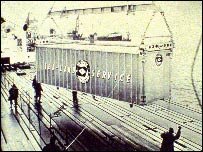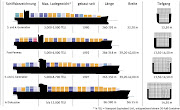The largest cost in the industry is Fuel, whether it is bunker, diesel, gasoline, or any other petroleum . This not only affects the vessel operators, but all facets of the industry that many people do not consider. Fuel prices have a large affect on: Tugs used to dock and undock the vessels at their berths, Diesel STS gantry cranes, Terminal equipment, OTR Truckers, Warehouse machinery, Rail Road Engines, and ect. In other words everybody is paying more to move goods and of course this increases the cost of all products at the stores.
So the question remains; Who pays for all the rising fuel costs?
Right now, everybody. How can this be made more fair and passed around fairly. At the end of the day the only entity not making out are the consumers. Does the consumer have a floating price of bread compared to the price of a barrel of oil? Of course not, but every other part of the logistics chain does. So the consumer makes out when oil goes up, but loses out as it decreases. How is this rectefied? The short answer is: It isnt.
A floating bunker surcharge is being used by the carriers but it does not make them "whole." The surcharge does not fully cover the price of fuel, so this eats into the carrier's profit margins. After that, the Tugs have fuel surcharge rates, terminals have fuel surcharges added in for each TEU shipped through, Truckers have a floating fuel rate added into the base rate, and so on and so forth.
The Floating fuel surcharges must be accepted by all aspects of the industry for it to work out properly. If it is not, some organizations are big winners and other big losers. The industry must work this into all contracts so that everybody is on an even playing field. All surcharges should be based on the price of a barrel of oil and not every different type of fuel.
About Me
- Transportation Industry Debater
- North East Coast, United States
- I am a transportation executive and have worked in the container shipping industry for most of my career. I have experience in terminal operations, rail operations, vessel operations, liner management, and contract negotiation. I find myself always searching for something new to learn, as well as other professional opinions about different issues, obstacles, and changes with in the industry. I have searched for a forum to discuss these happenings with other professionals but have found none. For this reason I have decided to create my own. I will put up my opinions and hope for the blog to catch on, so I may read others.
Subscribe to:
Post Comments (Atom)








2 comments:
I think fuel charges are too high and used too widely. Just up rates and stop fooling around with these different prices.
Your mode of explaining the whole thing in this piece of writing is truly nice, all be able to effortlessly be aware of it, Thanks a lot.
Stop by my website; nummerupplysningen
Post a Comment